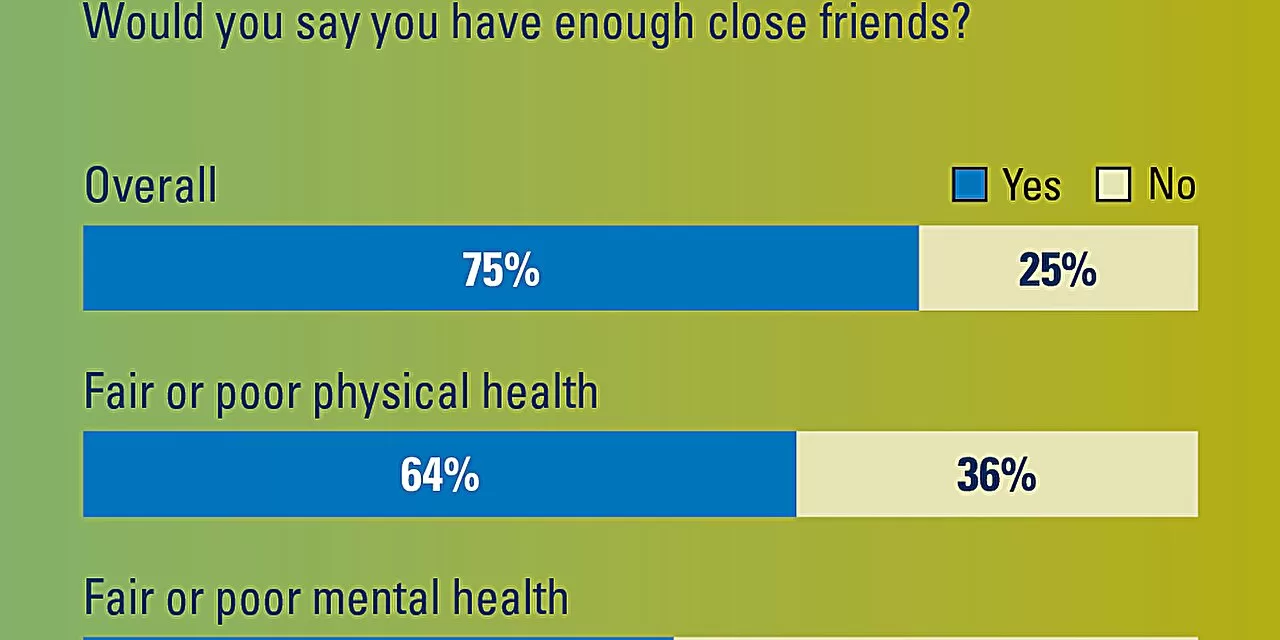A recent poll reveals that close friendships play a significant role in the health and well-being of adults aged 50 and older. The findings, from the University of Michigan National Poll on Healthy Aging, show that whether these friends are lifelong companions or new connections, near or far, their impact on older adults’ lives is profound.
The survey, which involved 3,486 adults aged 50 and older across the U.S., shows that 90% of older adults have at least one close friend, and 75% report having enough close friends. The majority, 70%, feel they can rely on their friends for support in discussing their health. However, challenges emerge for those with poor physical or mental health. Notably, 20% of individuals with fair or poor mental health reported not having any close friends, as did 18% of those with poor physical health.
Health and Friendship Connection
According to Sarah Patterson, Ph.D., a U-M demographer who contributed to the poll, the results underscore the growing recognition of the importance of social connections for older adults. “It’s crucial to explore the relationship between friendship and health and to identify those who might benefit most from efforts to support social interaction,” she said. The survey’s findings reveal that older adults in fair or poor health are more likely to feel they lack close friends and find it harder to make new ones.
Among those with at least one close friend, 79% said they could turn to them for emotional support, while 50% had friends who encouraged them to adopt healthier habits, such as eating better or exercising. Additionally, 35% reported that a close friend urged them to see a doctor about a health concern, and 32% had a friend assist them during illness or injury.
Dr. Jeffrey Kullgren, M.D., M.P.H., M.S., the poll director, emphasized the importance of healthcare providers asking about patients’ social support networks. “In some cases, we may even see friends accompanying older adults to healthcare appointments, which 15% of those with close friends reported,” Kullgren noted. He added that mental health should be a consideration, especially for those grieving the loss of a close friend.
Friendship Challenges for Older Adults
The poll also revealed some challenges faced by older adults in maintaining friendships. Men were more likely than women to report having no close friends, as were individuals aged 50 to 64 compared to those aged 65 and older. Adults who felt isolated or lacked companionship were also more likely to have fewer close friends.
Furthermore, older adults with fair or poor health were more likely to report difficulty in making new friends. Forty-two percent of older adults said it was harder to make new friends now than when they were younger, with 65% of those with poor mental health and 55% of those with poor physical health feeling the same.
Maintaining friendships also posed challenges, with 34% of older adults reporting it was harder now than in the past. This was particularly true for those in poor mental (61%) or physical (47%) health.
The Role of Generational Friendships
Interestingly, 46% of older adults with close friends reported having a friend from a different generation—at least 15 years older or younger than them. This generational diversity reflects the broad spectrum of connections older adults maintain.
The survey also found that 28% of older adults would like more frequent contact with their close friends, a sentiment especially strong among those with poor health.
Conclusion: The Value of Social Connections
Indira Venkat, Senior Vice President of Research at AARP, emphasized the critical role of friendships in older adults’ lives. “Strong social connections can encourage healthier choices, provide emotional support, and help older adults navigate health challenges, particularly for those at greater risk of isolation.”
The findings from the National Poll on Healthy Aging highlight the undeniable connection between friendships and health for older adults, urging a greater focus on supporting social interactions to improve their well-being.
For further details, including state-level data and an interactive visualization, visit michmed.org/4eGeJ.
The poll, conducted by NORC at the University of Chicago for the University of Michigan Institute for Healthcare Policy and Innovation, gathered data in August 2024, offering a snapshot of older adults’ social lives and their influence on health.










